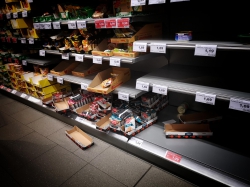From Bike Tires to Bread Starters
PROVO, Utah – Sep 10, 2020 – Talking about airline tickets, bike tires, and toilet paper all together in one conversation may seem unusual, but students in the global supply chain management (GSCM) program at the BYU Marriott School of Business talk about these products and many more in interactive online discussion boards, a new feature of the program’s introductory class. Making these connections between classroom concepts and supply chain principles in action prepares students to work in an ever-changing world.
Simon Greathead, BYU Marriott associate professor of global supply chain, saw an opportunity for meaningful online discussion when classes moved online due to the COVID-19 pandemic. As classes shifted to virtual learning, students also saw a shift in supply and demand for many items in the world around them. These changes in the supply chain of products such as toilet paper, canned goods, and recreational equipment provided a wide breadth of material for discussion in Greathead’s GSCM 305: Introduction to Global Supply Chain Management class. “COVID-19 was a supply chain context that impacted the students’ lives. They were thinking about the material that we were teaching in a way that was personal to them,” says Greathead.
Greathead administered the discussion boards using Canvas, a digital teaching platform available to BYU students and faculty. He introduced a new discussion topic every week. “In one of my discussion threads, I asked the students, ‘Consider a product you buy regularly. How has the context of COVID-19 impacted the supply chain to get that product?’” Greathead says.
“As part of that thread, I also asked students to comment on the posts of other students who wrote about a product that they were interested in,” he continues. “I wanted them to discuss how companies can mitigate some of the risks associated with the global supply chain of those products.” Students could both recognize a trend in the world around them and collaborate with other students to brainstorm solutions.
Through the discussion boards, students further related the concepts that they learned in class to the realities of their lives. When answering a question about how the supply and demand of a product might change over the next twelve months, one student posted, “As my family stayed inside, the only bread we bought were hot dog buns. Making bread as a family has become a fun activity to do together. However, for the next 12 months, I expect the sale of bread to gradually increase as school and work open and people need to start packing their lunch again.” Rather than only learning in a classroom about the supply and demand of bread, this student saw the supply chain affect her own family’s daily life.
In a different discussion thread, students were asked to reflect on relationships between companies in a time of disrupted supply chains. One student noted the impact of COVID-19 on the supply and demand of airplane tickets offered by travel agencies. “When quarantine restrictions were imposed globally, essentially grinding all air travel to a halt, it was no longer profitable for airlines to schedule as many flights, and there were fewer flights listed on travel agency websites,” she wrote. “As an international student from Singapore, these disruptions have affected my life greatly. I was almost unable to come back to Provo from Singapore, as I couldn't find a flight that was not exorbitantly expensive.”
In the fall, the introduction to global supply chain class will include some socially distanced in-class activities, but Greathead also plans to continue to use discussion boards to facilitate collaborative thinking. “In our remote-learning classes, those discussion boards have taken the place of in-class exercises, but I think we’re still going to use them when we go back to the classroom to augment some of our learning and engage students in the material outside of class.”
While online discussion and Zoom lectures may require students to adopt new methods of learning, Greathead knows that the ability to adapt to change that his students gain from this situation will also help them adapt to the modern workplace. “Our students will be engaging with these same types of digital tools down the road with their coworkers,” he says. “Online interaction like this is a good model of the benefits or drawbacks of online teams and project work.”
Media Contact: Chad Little (801) 422-1512
Writer: Kenna Pierce




